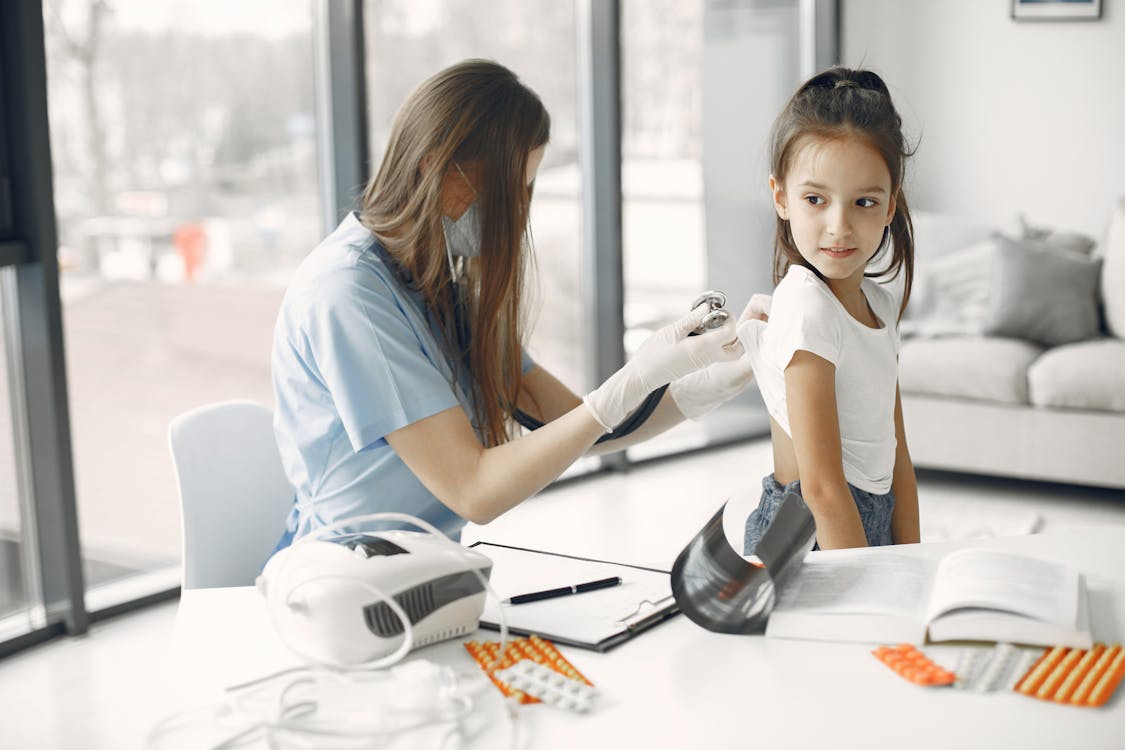In this modern fast-paced world of technology, world healthcare systems are evolving, and health information is more accessible than ever preventing care awareness has become the strategy for maintaining optimal health, and here comes the need for preventive healthcare measures. Today it is possible for an individual to significantly reduce the risk of developing serious health conditions by taking preventive healthcare measures like vaccination regular screening and annual check-ups. This comprehension article will guided with 10 essential preventive Healthcare Measures which are designed to optimise your well-being to ensure that you stay ahead of potential health issues.
Table of Contents
1. Vaccination: The First Line of Defence
Vaccination is a very fast and preventive healthcare measure as it offers protection against a range of infections and diseases. Vaccination boosts the immune system to identify and combat pathogens without causing the disease itself.

Childhood Vaccination
Children are to be ensured to receive their vaccination according to the recommended schedule by the Health Organisation. Children’s vaccines include vaccines for various diseases such as measles, mumps, rubella (MMR), and whooping cough (DTaP). Childhood vaccines not only protect the child as an individual but also contribute to community immunity and can be a good tool for community healthcare measures.
Flu Vaccine
Young children are very vulnerable to the influenza virus which may cause severe respiratory illness and for the elderly and those with underlying health conditions. It is recommended to have two vaccines annually for everyone from the age of 6 months and older as a preventive healthcare measure. It’s very important to get vaccinated each year as a healthcare measure because flu viruses change and new vaccine formulations are prepared in the lab.
COVID-19 Vaccine
The COVID-19 pandemic, in this decade, has marked the importance of vaccination. One must stay up to date with COVID-19 vaccination and booster doses to be protected against severe illness and transmission reduction as this virus is very much evolving with its new species. So updated vaccination is recommended as one of the very basics of preventive healthcare measures..
Shingles Vaccine
Shingles are caused by the reactivation of the varicella-zoster virus and the virus can result in painful rash and long-term complications after that recovery. Having shingles vaccines, as a preventive healthcare measure, ensures a decreased risk of developing shingles and associated hazards or diseases.
Pneumonia Vaccine
Pneumonia is caused by the pneumococcal pneumonia virus and pneumonia can lead to serious health complications, especially for adults and individuals with chronic diseases. This vaccine is recommended for individuals over 65 years of age and those with chronic disease issues to get help in the prevention of this potentially severe infection.
Why Vaccination?
Because vaccination plays a crucial role in an individual and Public Health. According to professionals, it is possible to prevent the spread of infectious diseases through vaccination. It also protects vulnerable populations who are not in a state to have vaccine because of medical reasons. In addition to this, vaccines create hard immunity and reduce the overall prevalence of disease and its outbreaks. So, it forms an important healthcare measure.
2. Regular Health Screening as Early Detection Saves Lives
If there are some potential health issues in an individual, health screening is essential and it can identify the issue before it manifests into serious conditions. Health screening tests detect diseases in the early stage when they are more treatable, manageable, and curable.

Screening for Adults
Blood Pressure Screening
Individuals especially adults with hypertension have the most significant risk factor for cardiovascular diseases including heart attacks and brain stroke. Regular monitoring of blood pressure can identify high blood pressure early and can allow for lifestyle changes or medication and ultimately it can manage the condition before becoming worse.
Cholesterol Test
If an individual suffers from high cholesterol, the fact can lead to atherosclerosis increasing the risk of heart disease. Adults should check their cholesterol levels regularly if there is a family history of heart disease and chronic disease.
Diabetes Screening
Diabetes can be developed without noticeable symptoms. So regular blood pressure checks and sugar tests are important to monitor risk factors such as obesity, and family history of heart disease.
Cancer Screening
It is proven that if cancer is detected in the early stage it is somehow curable. So cancer screening is very crucial for adults if there is the slightest of symptoms or suspects symptoms. Cancer screening may vary based on age, gender, and risk factors. The importance of this healthcare measure is high.
Breast Cancer
Women starting at the age of 40 to 50 depending on individual risk factors, may be prone to breast cancer. Mammograms are recommended for diagnosis.
Cervical Cancer
HPV tests or pap smears can be recommended for women on and from the age of 21. Conducting the tests may be done frequently or in regular intervals depending on the age and test results.
Prostate Cancer
Prostate-specific antigen (PSA) test is recommended for men over 50 and who have the risk of prostate cancer.
Colorectal Cancer
For the suspicion of Colorectal Cancer colonoscopies are often recommended for adults starting at the age of 45 or in some cases earlier for those who have a family history or other risk factors in this regard.
Screening for Children
Vision and Hearing Tests
Now vision and hearing tests are done for a child immediately after its birth. Regular vision and hearing screening are essential for early detection of complexities that could impact a child’s development and learning process. The earlier the detection the earlier can preventive measures be taken to avoid long-term complications in development.
Developmental Screening
Pediatricians can conduct now developmental screening to assess or understand a child’s growth and developmental abilities if the screening a done early and if there is some sign of developmental retardation, it will allow the doctor timely intervention and support to conduct the remedial process.
3. Annual Health Checkups: The Foundation of Preventive Care
Nowadays, people are more concerned about routine annual health checkups and for comprehensive evaluation of overall health. This is a very good sign and can offer an opportunity to review and address if there is some aspect of health issue and can ensure attention and measure proactively.

General Health Assessment
Physical Examination
Physical examination helps to assess the general health of an individual and identify health concerns if there are any at all and your doctor can treat you beforehand.
Medical History Review
During your routine check-up, discuss with your doctor, if there are any changes in your health. Also discuss your family medical history, and your lifestyle so that by analyzing/ this information, your doctor can develop a personalized preventive care plan.
Personalized Recommendations
Lifestyle Advice
Such recommendations undoubtedly vary from individual to individual based on your health assessment, your doctor may recommend diet improvement, physical exercise, increasing or decreasing medicines, or making other changes in your lifestyle for your overall well-being and prevention of diseases.
Medication Review
While taking medicine, you must go for regular checkups to provide an opportunity for your doctor to review the improving or deteriorating condition. It is very effective and by accessing the parameters, the doses of the medicines can be altered.
4. Dental Check-ups
To take care of your teeth, just cleaning is not enough because oral health plays its role as a crucial component of overall health. So regular check-up is needed for the prevention of oral diseases.

Prevention of Gum Diseases and Cavities
For the most common or all diseases, sometimes regular toothbrushing is not enough for cavities and gum disease. So examination may help to prevent the disease of cavities and gum. If not it can lead to gum inflammation. So routine cleaning of teeth and gum and examinations are necessary.
Oral Cancer Screening
Dentists, if needed, can perform oral cancer screening to detect early signs of oral cancer. Remember, for any disease or health hazard, early detection is the key to effective treatment and better results.
Maintaining Good Oral Health
Professional Cleanings
To maintain good oral hygiene, regular cleanings to remove plaque and tartar that is not effectively done even after brushing and closing or applying. So there comes the need for professional cleaning.
Personalized Advice
Dentists may recommend personalized advice to change diet and lifestyle to support oral health.
5. Eye Examination
For protecting your vision, regular eye examinations are very crucial for detecting vision problems and eye diseases and this will ensure precautions for any issues regarding vision.

Refractive Errors
Through tests, refractive errors can be identified. If there are any refractive errors such as nearsightedness, foresightedness, or astigmatism, these errors may be corrected with glasses, contact lenses, or surgeries.
Age-Related Conditions
After a certain age, glaucoma, macular degeneration, and cataracts are the most common eye issues. If these are detected timely, through treatment, it may be corrected through treatment.
Eye Health Prescription Maintaining
Your glasses and contact lens prescriptions should be updated to ensure clear vision. The doctor may take preventive measures and advise updated power for your eyeglasses and also may refer special glasses for your eyes from UV damage and other environmental factors.
6. Mental Health Check-up
emotional health or emotional well-being is equally important as Physical health because it is a crucial component of overall health so regular checking
Addressing Mental Health Issues
Mental health professionals can help you address mental health issues, if any.
Early Detection
If there is any issue with depression, anxiety, or stress, you should contact a mental health doctor or psychiatrist for effective treatment.
Therapeutic Support
It may be necessary for some people to go for regular therapy sessions to have strategies for managing mental health challenges. Sometimes regular counseling and medication are also needed as preventive healthcare measures.
Stress Management and Healthy Lifestyle
Stress management is very important to have overall sound mental health, sometimes the doctor may advise to change lifestyle for this.
7. Bone Density Test for Preventing Osteoporosis
Bone density test, as a preventive healthcare measure, is very important in detecting osteoporosis. In osteoporosis, one’s bone gets weakened and there is an increase in future risk factors.
Who Should Get Tested
Post-menopausal women, women over 65, and women under 65 with the risk factor should go for bone density testing. Men with factors such as family history, history of fracture, or certain medical conditions should consider the need for bone density tests. Bone density testing benefits to identify low bone density at all stages. It allows for intervention to strengthen them with medication, treatment, and planning as parts of preventive healthcare measures. The test results may help to go for exercise and dietary changes.
8. Regular Health Screening for Chronic Conditions
Regular health screening for chronic conditions is crucial for preventive healthcare measures.
Hypertension
Monitoring blood pressure regularly can help manage blood pressure and reduce the risk of complications like heart disease.
Diabetes
Regular blood sugar monitoring and screening is also a good option for preventive healthcare measures and helps manage and control sugar levels in the blood and would have time for the prevention of diabetes-related health issues.
Asthma and Allergies: Breathing Tests
Breathing tests can regularly be done for managing asthma and allergies. If needed, the doctor may suggest remedies for improving quality of life.
9. Immunizations for Travel: Destination Specific Vaccinations
Travel Vaccines
Depending on your destination, vaccination for certain diseases such as typhoid, hepatitis A and B, and yellow fever might be necessary. So travel vaccine is considerably a great preventive healthcare measure.
Routine Vaccines
Routine vaccines ensure up-to-date vaccination and they can help protect against diseases that may be prevalent in other countries.
Travel Health Tips: Preventive Medications and Health Precautions
For certain regions, preventive medications for diseases like malaria or some other diseases may be suggested by health experts for preventive healthcare measures. You should follow guidelines for food and water safety for the prevention of elements while traveling.
10. Lifestyle Evolutions for Enhancing Overall Health
Regular evaluation of lifestyle factors like exercise, and diet are essential for maintaining sound health.
Diet and Nutrition Counseling
Diet and nutrition counseling is beneficial for an individual playing a vital role in preventive healthcare measures to develop overall health. Nutritionists can help an individual to have a customized and balanced for sound health. For more information, you can just go through the article on our site.
Routine Exercise
Routine exercise and physical activities play a vital role in overall health as a preventive healthcare measure. Experts or professionals may personalize fitness plans for an individual. It can help maintain a healthy weight and reduce overweight. This manages and reduces the risk associated with smoking, alcohol, and other substances.
Conclusion
Preventive Healthcare measures like vaccinations, screenings, and regular health checkups have very important roles in maintaining overall health and preventing serious diseases. You can stay protected and informed about your health condition, take control of your health, and improve your lifestyle. Proper implementation of these 10 Preventive Healthcare Measures will help you to be ahead of potential health issues and will ensure a healthy future. Practice these 10 preventive healthcare measures and consult with your healthcare experts to plan that will best suit your needs. By focusing on these preventive measures you will not just address immediate health concerns but also invest in long-term wellness and quality of life.
Stay vigilance, be healthy, and embrace the power of preventive care. Follow the following website for more information about preventive healthcare measures https://health.gov/healthypeople




